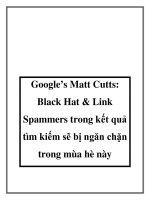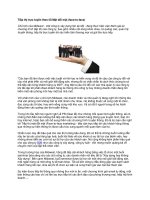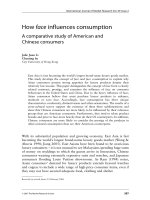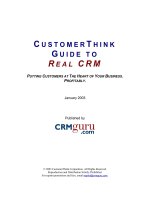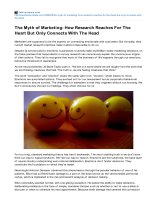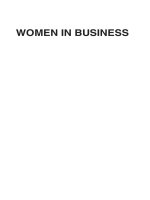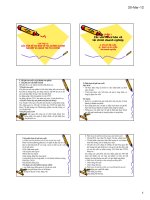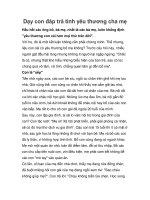THICK FACE BLACK HEART potx
Bạn đang xem bản rút gọn của tài liệu. Xem và tải ngay bản đầy đủ của tài liệu tại đây (1.34 MB, 369 trang )
To the reader:
Throughout the book the generic "businessman" and the
pronoun "he" have been used for the sake of brevity. In all
instances it is the author's intention to imply both the male
and female gender.
I
Contents
Acknowledgements ix
Introduction 1
1 The Essence of Thick Face,
Black Heart 7
2 Preparation for Thick Face,
Black Heart: Eleven Principles
For Getting Free 29
3 Dharma: The Wish-Fulfilling Tree 71
4 Dharma and Destiny 91
5 Winning Through Negative
Thinking 109
6 The Magical Power of Endurance 135
7 The Mystery of Money 161
8 Deception Without Deceit 187
vu
CONTENTS
9
10
11
12
13
14
15
16
Sixteen Noble Attributes of Work 203
The Advantage of Playing the Fool 223
Thriving Among the Cunning &
Ruthless
Acquiring the Killer Instinct
Thick Face, Black Heart
Leadership
Thick Within, Black Within
Paths to Thick Face, Black Heart
How a Piranha Eats the Shark
Epilogue
Appendix: Thick Black Theory
231
265
287
303
325
345
363
367
VUl
THICK FACE, BLACK HEART
Acknowledgments
My gratitude to all those who have passed through my life,
whether in a positive or negative manner. All have contributed
in some way to the substance of this book.
My gratitude to:
• Kurt Survance, who patiently saw me through my numerous
false starts and provided me the necessary insights to structure
this book.
• Karen M. Dibblee; without her input this book would not
have been the same.
• Gayle Vrla, my friend, who is always there for me.
• Dottie Walters, for her unfailing spirit and support.
• J.J. Liu Tsai, my former classmate, for her love and friend-
ship.
• Tamra Sinclair for her great patience.
I give a special thanks to the reference departments of the
Marin County Library in California and the Mulmoah
County Library in Oregon.
To all I am indebted. Without their teamwork this book
would not have been possible.
IX
fl
THICK
FACE
BLACK
HEART
INTRODUCTION
Introduction
I
n 1949, at the age of three, holding tight onto my
mother's skirt, I ran with my parents and two
younger brothers across a Shanghai airport runway.
Amid the sound of bombs blasting, we boarded the last
commercial flight out of China.
From a life of affluence and privilege, my family was
reduced to the condition of faceless immigrants among
millions in Taiwan who had fled the conquering communists.
All the possessions we were able to salvage from the devasta-
tion of our lives fit into the suitcases my parents carried.
In 1969, when I was 22,1 left Taiwan to begin a new life
in America. Once more a faceless immigrant, I arrived in Los
Angeles with two suitcases containing the few possessions I
was able to bring to my new home: clothes I had made for
myself, a few personal effects, and two books.
By this time, I had already read hundreds of books, and I
owned many; but I brought only two to the United States:
Sun Tzu's Art of War and a slim, black-bound volume written
by Lee Zhong Chang called, Thick Black Theory.
The Art of War, an ancient book of strategy and wisdom,
is fairly well known in the West. Thick Black Theory, howev-
er, is a relatively modem work and is still virtually unknown
outside of China.
Although I cannot say exactly why I brought Thick Black
Theory with me, at the time I had a strong, intuitive sense that
l
INTRODUCTION
it would prove to be very important. In its original form, it is
an erratic, difficult book. Lee's writing is obscure. His
arguments include great intuitive leaps that often left me
behind. But after my first reading of Thick Black Theory, I
knew that there was something very profound in it. For the
past twenty years I have returned to this book time and time
again, not quite knowing why, except for a powerful and
disturbing sense that it held the key to a puzzle I was trying
to solve. It has colored the way I now think about all the
experiences of my life. I left many precious possessions
behind in Taiwan, but was able to bring Lee's invaluable book
with me to America.
Lee first published his ideas in 1911, a year of chaos and
profound change in China. It was the year of the overthrow of
the Ching dynasty, the last in a succession of imperial
dynasties that stretched back to the beginning of human
civilization.
Thick Black Theory has never been translated or published
outside of China. Even within China, Lee's frank discussion
of the uses of ruthlessness and hypocrisy was so disturbing to
the ruthless and hypocritical, that Thick Black Theory has been
banned almost since the day of its publication.
Even if Thick Black Theory were to be faithfully translated,
it would still be incomprehensible to most non-Chinese. The
Chinese language is highly context-oriented. The basic build-
ing blocks of the language are short, three and four character
phrases that have an extended meaning far beyond the literal
meaning of the characters that make up the phrase—somewhat
like idiomatic expressions in English. This extended meaning
is derived from history, ancient literature, folk-tales, and a
myriad of other sources. Thus, in a few characters, a Chinese
writer can express a very complex idea by skillfully combining
these associations. Foreigners who are considered fluent in
Chinese, but do not have an intimate knowledge of the
2
INTRODUCTION
Chinese culture, often understand the words, but are unaware
of the levels of meaning that are subtly implied.
With Lee's work, this difficulty is even more extreme. His
chaotic style makes him difficult to understand even for
learned Chinese. He writes in brief, disconnected epigrams that
are meaningless to anyone not deeply immersed in Chinese
literature.
In its original form, Lee's Thick Black Theory is of little
use to Westerners. But I have always felt that his profound yet
bluntly honest vision of the world, which is the essence of
Lee's philosophy, would be of great importance to anyone
who desires to exert a measure of control over their own life.
It is this vision, this attitude, this essence, that I refer to
simply as Thick Face, Black Heart.
Lee estimated that it would take three years of studious
endeavor to master the practice of his ideas. Lee's ideas
ignited the sparks within me that led me to explore in great
depth for the past twenty years, the unchartered reality of our
daily lives in relation to Thick Face, Black Heart.
In my inquiry, I discovered there are two distinct levels of
understanding. There is the superficial aspect: learning the
methods and practices by which you can get what you want by
imposing your will on others, and there is the deeper, spiritual
understanding of Thick Face, Black Heart as the natural and
proper state of your soul.
Having been raised in China, I was already immersed in
Buddhism, Taoism, and Confucianism, despite the fact that I
was Catholic. The principles of these religions are so deeply
ingrained in Chinese culture that it is not necessary to formally
profess any of them to be influenced by them. My continuing
search for understanding took me to all parts of the world. I
studied the Hindu scriptures and Christian mystics. At one
point in my life, I gave up my successful business career in
Los Angeles and moved to a remote mountain in the Oregon
Cascades for a long period of meditation and soul-searching.
3
INTRODUCTION
As my horizons broadened, I came back to my Chinese
roots with a new perspective. I looked at Buddhism, Taoism,
Confucianism, and their Japanese extraction: Zen Buddhism.
It became clearer and clearer to me that these diverse religions
and philosophies shared the same central principle and that if
I could understand and extract this principle, it would give me
the power and control over my own life that I sought. In my
struggle to articulate this principle, I kept coming back to Lee
Zhong Chang and the phrase, Thick Face, Black Heart.
Although I do not believe that at the time he wrote Thick
Black Theory, Lee himself clearly realized the full breadth and
depth of his subject, I understand now that the value of Lee's
work was in his putting a secular face on a principle that had
previously always been discussed in abstract, religious or
philosophical terms.
For years I tried, without success, to write about Thick
Black Theory. Finally, I turned away from it and wrote my
first two books, The Chinese Mind Game and The Asian Mind
Game. Now, at last, I can write Thick Face, Black Heart. The
ideas I express are my own, but I wish to acknowledge my
debt to Lee. However, my book is not an interpretation of
Lee's work. To me, his book was not so much a source of
knowledge but rather a way of looking at things, a starting
point for the development of my own thoughts and a touch-
stone for the examination of new ideas and experiences.
The result of my inquiry is that from this book, you can
receive the instant benefit of the knowledge of Thick Face,
Black Heart as a concentrated, potent capsule. The knowledge
revealed in this book will mirror your own life experiences
that are familiar to you and that you are not able to verbalize.
Because of the novel ideas in this book, in an instant, a
revelation in your understanding can occur.
4
Give up virtue, renounce wisdom;
people will benefit a thousand times.
Give up kindness, renounce morality,
people will embrace love and filial piety.
Give up cleverness, renounce greed,
bandits and thieves will vanish.
—Lao Tzu, Tao Te Ching
A The Essence of
Thick Face,
Black Heart
When you conceal your will from others, that is Thick.
When you impose your will on others, that is Black.
—Lee Zhong Chang
T
hick Face, Black Heart, is the secret law of nature
which governs successful behavior in every aspect
of life. The American pioneers had it. The Asian
businessmen use it. From the ancient to the present, all
successful people utilize the secret. Thick Face, Black Heart
is the wisdom of the soul and it knows no division of national-
ity, race, or religion. The implementation of this law benefits
people in their business practices as well as in their personal
lives. By being true to the law of nature in our daily encoun-
ters, we will fulfill the highest potential within and around us,
thus leading us to the proper unfolding of our destiny.
7
THICK FACE, BLACK HEART
through the utilization of the power of Thick Face, Black
Heart, each one of us will discover the destiny to which we
must be true.
Americans are constantly bombarded through the media
with images of success and happiness. Success is often judged
by our possessions; the make of car we drive, the designer
watch we sport, or the latest fashions we have wrapped around
our bodies.
A successful life is one that is lived through understanding
and pursuing one's own path, not chasing after the dreams or
fulfilling the expectations of others.
Many people are so completely obsessed with the pursuit
of false euphoria that they attempt to deny the existence of
life's difficulties. A positive attitude is important, but it is only
part of the story. Understanding how to surmount pain, doubt
and failure is a vital component in winning the game of life.
So often we are so concerned with what makes us feel good
that we forget what makes us great.
Character is not made out of sunshine and roses. Like steel,
it is forged in fire, between the hammer and the anvil. By
getting in touch with the power of Thick Face, Black Heart,
you will realize a new consciousness.
One of the results of reading this book will be the shatter-
ing of your traditional concepts of ruthlessness. Thick Face,
Black Heart is and is not about ruthlessness. You will learn
that by adapting and adopting a form of non-destructive
ruthlessness, you will gain the freedom necessary to achieve
effective execution of your life's tasks.
Thick Face, Black Heart is not about mastering a specific
skill nor is it something I can give to you. The power of Thick
Face, Black Heart is already within you. It is your inner
strength and the natural state of your true self, where perfect
joy, clarity, courage, and compassion are an inseparable part
of you.
By tapping into this power, to whatever degree you can,
you cannot fail to benefit. The power of Thick Face, Black
THE ESSENCE OF THICK FACE, BLACK HEART
Heart will guide you to be effective in your actions and lead
you to your desired results. Most of all, by getting in touch
with this power within you, you will gain unshakable clarity
and focus to help you discover and achieve your intended
destiny.
The Inward State
Thick Face, Black Heart is not a doctrine in itself. Rather it
concerns an element that is common to many doctrines. On its
practical, less philosophical level, Thick Face, Black Heart is
simply about action and its effectiveness.
To take an example from modem America: dozens of
books are published each year that attempt to teach you how
to make yourself a more effective executive, a better salesper-
son and generally a happier, more dynamic individual. In these
books the author prescribes a course of action that will lead to
the desired result. It is generally a plan that has worked for the
author and for some of his students. But it doesn't necessarily
work well for many readers, even though they carefully follow
the author's instructions. For example, two people can read the
same book on lion-taming. They can enter the lion's cage
dressed identically. They can use identical gestures and words
to command the lion, but the results will not be the same. One
of them will get the lion to jump through the hoop and the
other will end up as a gruesome mess on the floor of the
lion's cage.
These authors do not seem to be aware that there is an
inward state that must be achieved in order for words and
actions to be effective. The experts who write these books are
good at what they do because they have had the luck to
achieve that state intuitively or unconsciously. They do not
seem to comprehend the problems of those who have not been
so fortunate.
9
THICK FACE, BLACK HEART
Thick Face, Black Heart is a theory of great practical use.
It can be applied to any endeavor, and utilized for either good
or evil purposes. The first superficial exposure to Thick Face,
Black Heart is often shocking and repellent because it can
serve the criminal as easily as the saint. It seems to be a
selfish, ruthless and completely amoral concept. However, I
contend that these do not necessarily have to be destructive
attributes.
As the name implies, there are two elements to this inward
state: the Thick Face, and the Black Heart.
Thick Face—The Shield
Consider the Asian concept of face. It refers to how other
people think about you and treat you. Most Asians are
tremendously concerned that others think well of them and
especially that others display respect for their personal dignity.
Juxtapose this idea with the Western notion that having a thick
skin and being insensitive to criticism and the negative opin-
ions of others is the best. Fused together, these two ideas
approximate the concept of Thick Face: a shield to protect our
self-esteem from the bad opinions of others. A person adept
at Thick Face creates his own positive self-image despite the
criticism of others.
In attempting any goal, there is always room for doubt
about our ability to achieve, our motives for achieving, or our
worthiness to receive the benefits of achievement. Often we
feel a need to first improve ourselves and that only after we
have become more worthy, will we be able to achieve the
fulfillment of our dreams.
The thick-faced person has the ability to put self-doubt aside.
He refuses to accept the limitations that others have tried to
impose on him and, more importantly, he does not accept any
of the limitations that we commonly impose on ourselves. He
10
THE ESSENCE OF THICK FACE, BLACK HEART
does not question his ability or worthiness. In his own eyes,
he is perfect.
The world has a tendency to accept our own judgement of
ourselves. By his absolute self-confidence, the thick-faced
person instills confidence in others. They see him as success-
ful and allow him the latitude to succeed.
Former President Reagan represents a good example of a
Thick Face. He had very limited skills as an administrator. His
aides' most important job was to prevent him from making
off-the-cuff remarks about complex issues. Whenever he did,
he invariably betrayed an appalling ignorance of the subject.
But Mr. Reagan had such an unshakable image of himself as
a great statesman that he acted decisively even when totally
ignorant of the issues involved. His simple answers made
America feel confident. After years of social turmoil at home
and humiliation abroad, Americans began to feel good again;
to feel that things were under control once more. The Ameri-
can people shared Ronald Reagan's opinion of himself and he
finished his term of office as the most popular president in
recent history.
On the other hand, another former president, Jimmy Carter,
better understood the awesome responsibilities of his office,
but was completely overwhelmed by them. He was too keenly
aware of his own limitations. Consequently, he agonized over
important issues. The American people interpreted his agony
as incompetence and turned him out of office by a wide
majority. By truly appreciating the difficulties facing the
nation and allowing the public to share in his insecurities,
Carter projected a sense of powerless despair.
If Colonel Oliver North had felt one shred of guilt about
the crimes to which he admitted involvement in the Iran-
Contra Affair, he would be in jail today. Instead, he is a free
man, a symbol of patriotism to millions, and a speaker who
commands huge fees. He expressed no remorse for his
criminal actions. Oliver North believed so strongly that he was
a patriot that he communicated a heroic image to millions of
11
THICK FACE, BLACK HEART
people. A man less convinced of his own righteousness would
have been severely punished for his crimes and ostracized by
the public.
A Thick Face need not be assertive or aggressive. He may
be humble and submissive. Thick face is the ability to adopt
whatever manner the situation calls for without regard for
what other people think of you.
There is an ancient Chinese story about a young man
named Han Xin who had a reputation as a skilled Kung-Fu
fighter. One day when Han was walking through the streets of
his city he was stopped by two men who had heard of his
skill. The pair challenged him to a fight to the death. Han tried
to decline the challenge but the men would not let him walk
away. They insisted he must either fight or crawl like a dog
through the leader's out-spread legs. Although to the Chinese
this is an unspeakable humiliation, Han Xin chose to crawl
rather than fight.
Word of his humiliation and his cowardice spread quickly
through the city. He was laughed at openly, but never once
offered any excuse or explanation for his seemingly spineless
action. Later in his life, he revealed himself to be one of the
most formidable and fearless warriors in the history of China.
To him, the pair of unschooled ruffians had posed no threat.
It was simply that they were unworthy adversaries. In his heart
he knew himself to be a fearless warrior. He did not care what
anyone else thought. Han's Thick Face was a meek and
cowardly facade, adopted to save himself the trouble of killing
two such inconsequential hoodlums.
In contrast to Han Xin's inner sense of his own worth,
there is the case of a friend of mine who is currently involved
in helping a doctor develop and patent a prototype piece of
medical equipment. In the beginning, there was a vague and
inconclusive discussion about a partnership in exchange for
my friend's technical expertise in building the apparatus.
Since then, my friend has worked tirelessly, but nothing
more has been said about the partnership or any other form of
19
THE ESSENCE OF THICK FACE, BLACK HEART
compensation. My friend is reluctant to bring it up because he
does not have the prototype working properly and he does not
feel worthy of compensation. He has not asked my advice, so
I have not given it. I think he would do well to adopt the thick
face of a man with a strong sense of his own worth. He would
get his partnership for precisely the reason he is using as an
excuse not to confront the doctor: the device is not yet
working right. He is still needed.
When he has it working and feels confident enough to go
to the doctor to discuss compensation, who knows what he
will get? At that point, he will be at a severe disadvantage.
The doctor will have already achieved his objective and may
have no further use for him.
Black Heart—The Spear
Black Heart is the ability to take action without regard to how
the consequences will affect others. A Black Heart is ruthless
but it is not necessarily evil.
Before the advent of modern medicine, a surgeon operated
without being able to anesthetize the patient. He had to be able
to cut swiftly and decisively without any regard for his
patient's screams and entreaties. In order to be effective, he
had to be extremely callous and emotionally detached from the
pain he caused.
Conversely, a general who is so full of human compassion
that he is reluctant to order soldiers to their death is of no use
to his country. He will be defeated and his people conquered;
whereas a black-hearted general can put the carnage of battle
out of his mind and fully concentrate on the required result—
victory.
An entrepreneur must be able to make hard decisions
regarding unprofitable operations. If he cannot, his company
will fail. The end result of short-sighted compassion for some
13
THICK FACE, BLACK HEART
employers will be the closure of their entire operation and all
of their employees out of work.
The black-hearted person is above short-sighted compas-
sion. He focuses his attention on his goals and ignores the
cost.
A black-hearted person has the courage to fail. Attempting
effective action always implies the risk of failure. A surgeon
who has an accident victim in need of a potentially dangerous
operation knows that the safest course for him is not to
operate. Although the patient is likely to die, the surgeon risks
little censure. If he operates and the patient dies, he knows
that he risks being blamed for the death.
Two Sides of the Same Coin
Thick Face and Black Heart are two sides of the same coin.
When one possesses the strength of Thick Face, one can
ignore the criticism and disapproval of the masses. This same
strength is also the source of the Black Heart; it allows one to
effectively use the spear to cut through the ignorant and
preconceived ideas of the masses.
It is not possible to practice Thick Face without Black
Heart, just as it is not possible to practice Black Heart without
Thick Face. The Thick Face, Black Heart practitioner must
exercise his ability to ignore criticism, ridicule or vilification
from others, and, at the same time, carry out his duties as he
sees fit. At any given time, one may freely draw upon more
power of Thick Face and less power of Black Heart or visa
versa as the situation dictates.
i/i
THE ESSENCE OF THICK FACE, BLACK HEART
Three Phases of
Thick Face, Black Heart
Phase 1: Winning at All Cost
Thick Face, Black Heart at its crudest level has no moral
overtones. It purely addresses how to get what you want: in
another words, winning at all costs. Thick Face at this level is
total lack of conscience; Black Heart is absolute ruthlessness.
In its crudest, most superficial form, Thick Face, Black
Heart is not about ethics, it is about effective action. A brief
glance at the newspaper provides an example: employees of a
major airline have been caught falsifying maintenance reports
and safety checks in order to reduce operating costs. The
executives who ordered these falsifications clearly understood
that they were placing the lives of their passengers, pilots and
crews in great jeopardy—which was totally disproportionate
to the money they were saving.
A spear is a useful tool for peacekeeping as well as a
weapon of death. Thick Face, Black Heart like the spear, does
not in itself contain evil and yet one can apply Thick Face,
Black Heart purely for the pursuit of selfish gains at any costs.
Some people are intuitively skillful at utilizing Thick Face,
Black Heart as a tool to fulfill their selfish motives. For these
people, no price is too high to pay for victory, as long as it is
achieved at someone else's expense.
From ancient times to the present, from East to West, there
are many instances of people who have gained through the
utilization of Phase One Thick Face, Black Heart. Observe the
failure of the American savings and loan institutions, and the
illegal dealings of the Bank of Credit and Commerce Interna-
tional. All of the "prestigious" individuals behind the scenes
15
THICK FACE, BLACK HEART
of these institutions are masters of the Thick Face, Black
Heart practice at its crudest level.
Their face is impenetrably thick; it shields them from all
possible criticism from others and from their own consciences.
Their hearts are so black that when they used their spears on
the unsuspecting, trusting public, they fated these innocent
depositors to slow death from financial bleeding. For these
individuals, selfish gain is the aim and Thick Face, Black
Heart is the means.
Phase One Thick Face, Black Heart leads us to winning,
yet our victory often has no sweetness. More often than not,
life, through its mysterious forces, will cause our ill deeds to
catch up with us. To conquer others through ruthless means is
not difficult: all you must do is agree to sell your soul to the
devil.
There are three stages of this Phase One level:
The first stage: Thick as a castle wall, black as charcoal. This
is the level of the cheap hustler, crook and con man. Although
the face is as thick as a castle wall, it is penetrable. Their
blackness is apparent to all who see them. They are distasteful
and repulsive in everyone's eyes.
The second stage: Thick and hard, black and shimmering.
These people are more advanced practitioners. They have
strengthened their face by hardening it; they have polished
their Black Heart to make it more appealing. They are no
longer the cheap hustler. Their outward appearance is respect-
able. They are the kind of people you think you can trust, only
to discover later you have been taken.
The third stap;e.: So thick it is formless, so black it is color-
less—the highest level. This is the level of seemingly virtuous
men who can ruthlessly pursue their own ends while being
is
THE ESSENCE OF THICK FACE, BLACK HEART
extolled by their victims for their virtue. Some of our politi-
cians, from the past to the present, have achieved such a state.
Phase 2: Self-inquiry
Conquering others requires force.
Conquering oneself requires strength.
—Lao Tzu, Tao Te Ching
Beneath Phase One, lie deeper essences of Thick Face, Black
Heart. Some people practice Phase One Thick Face, Black
Heart and find it to be repellent, even to themselves. Conse-
quently, they begin a process of self-inquiry.
Self-inquiry is a spiritual process. We cannot honestly or
completely address Thick Face, Black Heart without mention-
ing the spiritual side of life, as this aspect colors the realities
of all of our business practices and personal conduct. People
bring who they are to business and they usually behave in
business as they behave everywhere else.
In the eyes of the Oriental, there are no divisions between
business, the art of war, philosophy, and spirituality. The
wisdom of spirituality is the root of mundane living. While the
wisdom is one, the applications are infinite. Conversely, the
Western world generally segments the knowledge of living
into pieces and then files them away in separate compart-
ments. Those who practice Phase One of Thick Face, Black
Heart without the cultivation of Phase Two can become
dangerous people.
At the stage of self-inquiry, the individual is often vulnera-
ble because he has rejected the powerful, wicked behaviors of
Phase One and is in search of the realm of the unknown. His
spirit is also demanding greater satisfaction from his conduct.
He is in a state of uncertainty, confusion, and sometimes pain
and anger.
17
THICK FACE, BLACK HEART
He is overwhelmed by his own new discovery of a multi-
tude of enemies within himself in the form of his own
character defects: greed, anger, self-doubt, self-limitation,
jealousy, envy, fear, shame, worry, small-mindedness, hatred,
delusion, desire, selfishness, laziness, hypocrisy, and preten-
sion. He has discovered that his own mind is the root of high
and low, honor and insult, joy and sorrow, while at the same
time, his foes are many and his capacity to overcome these
obstacles is meager.
At this stage, even though he may look disheveled and be
considered disjointed by others, within himself, he is going
through a powerful transformation.
Phase 3: The Warrior
This final phase is the combination of all previous phases.
Here you will be able to create a meeting ground for the
sublime and the ruthless. The following are the qualities of a
warrior.
Dispassion and Detachment
After Phase Two, the practitioner becomes indifferent and
courageous. He adopts the warrior's attitude—dispassion and
detachment. He sees life as a battle that must be fought. There
is no way out. Victory is the only aim.
He dispassionately does battle with the wicked outer
elements while courageously facing his inner enemies. He is
then able to detach from them, so that their presence does not
thwart him. It is this power of detachment and dispassion
which enables the warrior to face life's challenges with calm
and grace.
18
THE ESSENCE OF THICK FACE, BLACK HEART
The thirteenth century Hindu philosopher, Shankaracharya,
mentioned that even the greatest warrior, when standing in the
midst of the battle field, sweats with fear. However, while his
body is fearful and his mind is fearful, his spirit is fearless. He
is able to detach himself from the fear of the body and the
mind, clinging instead to the fearlessness of his spirit.
Recently, I watched an old movie; a story about the
courage and love of the early American pioneer settlers. It was
evident that they understood the sublime state of calm
detachment. They were indifferent to suffering, taking action
in spite of their fear, enduring the loneliness, quietly accepting
and overcoming the adversity while never losing sight of their
objectives. Witnessing their warrior-like courage and self-
determination moved me many times to tears during the film.
It is not that you are not affected by the challenges and
become inert in this state of detachment. Rather, you are not
controlled by your emotions, so you may press on with greater
courage and renewed energy.
Fit for Greatness
I have seen many people grow old, but not graciously. Their
eyes reflect pain and disillusionment. They have been beaten
by life; they have so many broken dreams. The hope and ex-
pectations of youth have vanished—only death awaits.
The mistake they made was in not preparing themselves for
the harsh lessons their Creator set for them on their life's path;
necessary lessons to strengthen their spirit and make them fit
for greatness. Unlike the warrior who accepts harsh discipline
as a privilege and honor, these people are like pieces of grain
caught in the millstone, ground down by the wheel of life, in
agony and in pain.
As most do, I used to pray for good times and good
fortune. The prayer of "Let thy will be done" used to scare me
to death. However, in reality this world in which we live is
19
THICK FACE, BLACK HEART
fragile and ever changing, and our existence and survival is
delicately connected to the invisible thread of God's grace.
Gain and loss is the constant human condition.
As I watched the fire in the Oakland and Berkeley hills in
the San Francisco Bay Area that burned 700 luxury homes, it
confirmed again that it doesn't matter how much we wish to
ignore the possibility of any negative and unpleasant aspects
of our lives, our Creator writes His own script for life. Now
when I pray, I pray for the unshakable inner strength and the
strength of the warrior to accept these harsh lessons and learn
from them, not to be destroyed by them.
The Union of the Spiritual
and the Material Worlds
In this book we will be dealing mostly with Phase Three. We
will learn how to live in this world and not be a victim of it;
nor will we impose pain and loss unjustly on those who do not
deserve it. Our objective in practicing Thick Face, Black Heart
is to be able to defend ourselves against others' aggression.
In this way we become warriors, but not in the traditional
Western sense of "The killing machine." The outer ability of
the warrior to effectively execute his objective is guided by
inner wisdom which is cultivated through the acceptance of
life's challenges and the quest for spiritual balance.
The sixteenth century Japanese sword master Miyomoto
Musashi said "The warrior is one who uses the pen and sword
with equal skill." The message here is that to be a truly great
warrior, you must be skilled with more than your weapon. The
great soldier is a balanced being, who through his understand-
ing of life is able to master the virtue of his weapons. How
the samurai handles his sword is metaphorically equivalent to
how we handle our daily tasks, especially the task of surviv-
ing. Musashi also said "The way of warrior skill is the way of
nature. When you are in line with the power of nature,
20
